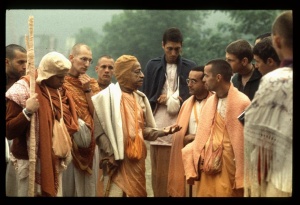CC Madhya 8.285 (1975): Difference between revisions
(Vanibot #0027: CCMirror - Mirror CC's 1996 edition to form a basis for 1975) |
(Vanibot #0020: VersionCompareLinker - added a link to the Version Compare feature) |
||
| Line 2: | Line 2: | ||
<div style="float:left">'''[[Sri Caitanya-caritamrta (1975)|Śrī Caitanya-caritāmṛta (1975)]] - [[CC Madhya (1975)|Madhya-līlā]] - [[CC Madhya 8 (1975)|Chapter 8: Talks Between Śrī Caitanya Mahāprabhu and Rāmānanda Rāya]]'''</div> | <div style="float:left">'''[[Sri Caitanya-caritamrta (1975)|Śrī Caitanya-caritāmṛta (1975)]] - [[CC Madhya (1975)|Madhya-līlā]] - [[CC Madhya 8 (1975)|Chapter 8: Talks Between Śrī Caitanya Mahāprabhu and Rāmānanda Rāya]]'''</div> | ||
<div style="float:right">[[File:Go-previous.png|link=CC Madhya 8.284 (1975)|Madhya-līlā 8.284]] '''[[CC Madhya 8.284 (1975)|Madhya-līlā 8.284]] - [[CC Madhya 8.286 (1975)|Madhya-līlā 8.286]]''' [[File:Go-next.png|link=CC Madhya 8.286 (1975)|Madhya-līlā 8.286]]</div> | <div style="float:right">[[File:Go-previous.png|link=CC Madhya 8.284 (1975)|Madhya-līlā 8.284]] '''[[CC Madhya 8.284 (1975)|Madhya-līlā 8.284]] - [[CC Madhya 8.286 (1975)|Madhya-līlā 8.286]]''' [[File:Go-next.png|link=CC Madhya 8.286 (1975)|Madhya-līlā 8.286]]</div> | ||
{{CompareVersions|CC|Madhya 8.285|CC 1975|CC 1996}} | |||
{{RandomImage}} | {{RandomImage}} | ||
==== TEXT 285 ==== | ==== TEXT 285 ==== | ||
<div class="verse"> | <div class="verse"> | ||
:āliṅgana | :āliṅgana kari' prabhu kaila āśvāsana | ||
:tomā vinā ei-rūpa nā dekhe anya-jana | :tomā vinā ei-rūpa nā dekhe anya-jana | ||
</div> | </div> | ||
| Line 18: | Line 17: | ||
<div class="synonyms"> | <div class="synonyms"> | ||
āliṅgana | āliṅgana kari'-embracing him; prabhu—the Lord; kaila—did; āśvāsana—pacifying; tomā vinā—but for you; ei-rūpa—this form; nā—not; dekhe—sees; anya-jana—anyone else. | ||
</div> | </div> | ||
| Line 25: | Line 24: | ||
<div class="translation"> | <div class="translation"> | ||
After embracing Rāmānanda Rāya, the Lord pacified him, informing him, | After embracing Rāmānanda Rāya, the Lord pacified him, informing him, "But for you, no one has ever seen this form." | ||
</div> | </div> | ||
| Line 32: | Line 31: | ||
<div class="purport"> | <div class="purport"> | ||
In the Bhagavad-gītā ([[BG 7.25 (1972)| | In the Bhagavad-gītā ([[BG 7.25 (1972)|7.25]]) Lord Kṛṣṇa states: | ||
:nāhaṁ prakāśaḥ sarvasya | |||
yoga-māyā-samāvṛtaḥ | |||
:mūḍho 'yaṁ nābhijānāti | |||
:loko mām ajam avyayam | |||
"I am never manifest to the foolish and unintelligent. For them I am covered by My internal potency [yogamāyā], and so they do not know Me, who am unborn and infallible." | |||
The Lord always reserves the right of not being exposed to everyone. The devotees, however, are always engaged in the service of the Lord, serving with the tongue by chanting the Hare Kṛṣṇa mantra and tasting mahā-prasāda. Gradually the sincere devotee pleases the Supreme Personality of Godhead, and the Supreme Lord reveals Himself. One cannot see the Supreme Lord by making personal efforts. Rather, when the Lord is pleased by the service of a devotee, He reveals Himself. | |||
The Lord always reserves the right of not being exposed to everyone. The devotees, however, are always engaged in the service of the Lord, serving with the tongue by chanting the Hare Kṛṣṇa mantra and tasting mahā- | |||
</div> | </div> | ||
Latest revision as of 20:11, 27 January 2020

A.C. Bhaktivedanta Swami Prabhupada
TEXT 285
- āliṅgana kari' prabhu kaila āśvāsana
- tomā vinā ei-rūpa nā dekhe anya-jana
SYNONYMS
āliṅgana kari'-embracing him; prabhu—the Lord; kaila—did; āśvāsana—pacifying; tomā vinā—but for you; ei-rūpa—this form; nā—not; dekhe—sees; anya-jana—anyone else.
TRANSLATION
After embracing Rāmānanda Rāya, the Lord pacified him, informing him, "But for you, no one has ever seen this form."
PURPORT
In the Bhagavad-gītā (7.25) Lord Kṛṣṇa states:
- nāhaṁ prakāśaḥ sarvasya
yoga-māyā-samāvṛtaḥ
- mūḍho 'yaṁ nābhijānāti
- loko mām ajam avyayam
"I am never manifest to the foolish and unintelligent. For them I am covered by My internal potency [yogamāyā], and so they do not know Me, who am unborn and infallible."
The Lord always reserves the right of not being exposed to everyone. The devotees, however, are always engaged in the service of the Lord, serving with the tongue by chanting the Hare Kṛṣṇa mantra and tasting mahā-prasāda. Gradually the sincere devotee pleases the Supreme Personality of Godhead, and the Supreme Lord reveals Himself. One cannot see the Supreme Lord by making personal efforts. Rather, when the Lord is pleased by the service of a devotee, He reveals Himself.